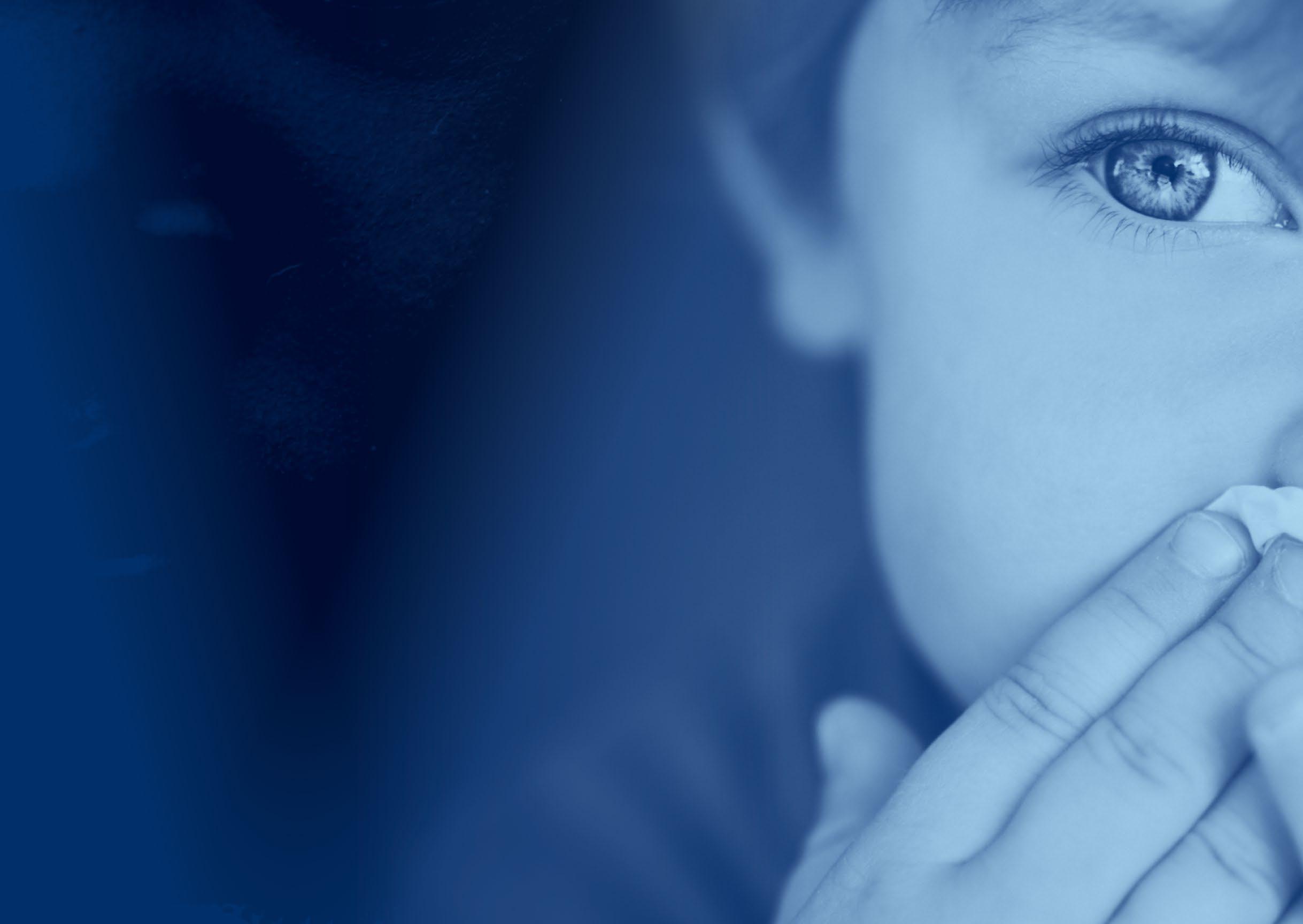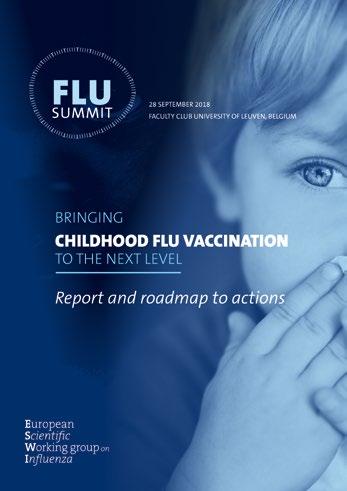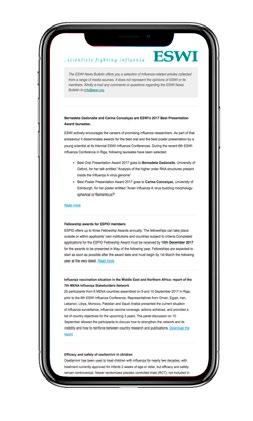2018 activities summary





realize its objective, ESWI has established
partnerships
influenza stakeholder organizations:
The European Scientific Working group on Influenza

a group of key scientific experts in influenza
have joined forces to reduce the burden
influenza in Europe:
Ted van Essen, Amersfoort, The Netherlands
Gülsah Gabriel, Heinrich-Pette-Institute, Leibniz Institute for Experimental Virology in Hamburg, Germany
Terho Heikkinen, University of Turku, Finland
Susanne Herold, University of Giessen Lung Centre, Germany
Edward C. Hutchinson, University of Glasgow, UK
Colin Russell, University of Amsterdam, The Netherlands
Peter Openshaw, Imperial College London, UK
Ab Osterhaus, Research Center for Emerging Infections and Zoonoses Hannover, Germany
Roman Prymula, Military Hospital of Hradec Kralove, Czech Republic
Sylvie van der Werf, Institut Pasteur, Paris, France
Marco Goeijenbier, Harbour Hospital Rotterdam, The Netherlands
On 28 September 2018, ESWI brought together some 60 influenza stakeholders for a day of presentations and debates on paediatric influenza vaccination. The aim of the meeting was to bring childhood influenza vaccination to the next level. To that end ESWI organized a stakeholders table for partner organizations, combined with a number of scientific contributions, Q&A and debate. The event was available via live stream video, reaching 590 viewers worldwide, many of whom weighed in on the discussions via Twitter and e-mail.

NEED
Pharmacists can offer additional access to vaccination. Data shows that when pharmacies are involved in vaccination, general vaccination rates go up as pharmacies complement the work of GPs. After all, many people who do not regularly visit the hospital or a GP, can be reached via community pharmacists. Pharmacies can even play a role in paediatric vaccination proper, if they are given access to shared electronic health records.
In addition, all physicians should be allowed to vaccinate. In many countries, including Austria, paediatricians are not allowed to vaccinate adults. It is hence impossible to vaccinate both parent and child during the same consultation.
Provide a consistent flow of information through all levels of healthcare, both primary and secondary care. National and international organizations of professionals and patients need to provide their members with the latest statistics and evidence before the start of the influenza season. This evidence needs to be compiled in a collaborative, multidisciplinary way to create consistent information. At the same time, communication must be transparent and also should mention the unknowns, as was demonstrated during the narcolepsy tragedy in Finland. (Although influenza vaccines are among the safest of vaccines, in the aftermath of the 2009 pandemic, health experts were confronted with a very important safety concern that had never been associated with any vaccine before: an increasing number of narcolepsy cases in Swedish and Finnish children. It is still not clear whether the disease was caused by the vaccine or by the influenza virus.)
Involve “behavioural economics”, a new emerging field that studies the economical impact of patients’ behaviour. The Finnish Institute for Health and Welfare (THL) has engaged an anthropologist to truly understand the nature of hesitancy in a cross-professional approach.
Provide health care workers (and especially GP’s) with incentives to vaccinate the at-risk groups against influenza.
Improve basic education and training of paediatricians and other health care workers in terms of vaccinology, microbiology and immunology. Still, not all paediatricians are aware of the benefits of flu vaccination, and recent developments (LAIV, H3N2 egg adaptation, wrong B in TIV, adjuvanted vaccines) add to the confusion. The influenza community must therefore continue to join forces and provide science-based evidence and information to paediatricians in symposia and via publications. After all, studies show that if healthcare workers recommend the influenza vaccine to their patients, patients are twice as likely to have the vaccine. In addition, nearly 50% of the vaccination coverage can be attributed to the personal recommendation by a healthcare professional.
Foster the debate on “mandatory vaccination” of paediatricians and health care workers. Summit participants strongly agreed that vaccination of healthcare workers is key to protect patients against influenza and unvaccinated caregivers should not be allowed to care for frail patients. Now is the time to assess the pros & cons of compulsory vaccination versus negotiated vaccination and to issue a joint standpoint, supported by all stakeholder organizations.

Adopt a more “holistic view” and make better use of the secondary data (health records) to better understand the role of children as transmitters of influenza and their impact on the health status of other parts of the population, notably on the older adults.
Introduce life-long vaccination, i.e. vaccination schemes for different phases of life, from young infants to the very old adults.
Patient organizations need to play an active role and help determine national health policy. Since organizations of influenza patients are non-existent, other interest groups need to step in, as demonstrated by an example from the Netherlands, where the national union of the elderly was alarmed by the fact that it had lost 10,000 members to the flu.
Cost-effectiveness studies in Finland and the UK have demonstrated that influenza immunisation of children in these countries provides both health benefits and economic benefits. Obviously, cost-effectiveness is dependent on how national health care systems are organized, studies must hence be set up in individual countries to assess the potential benefits. In this context, ECDC is developing a system and tool box to assist national governments in performing cost-effectiveness studies.
Videotaped lectures are available on ESWI TV at www.eswi.org/eswi-tv/category/ eswisummit18/
A full report of the meeting is to be found here: www.eswi.org/flusummit/wpcontent/uploads/sites/12/2018/12/ ESWI_childhood_report_2018.pdf
As a preparatory step, ESWI met individually with a core group of leading organizations:
■ Diabetes UK
■ Pharmacist Group to the European Union (PGEU)
■ Foundation of European Nurses in Diabetes (FEND)
■ Immunology of Diabetes Society (IDS)

■ The International Diabetes Federation (IDF Europe)
■ European Association for the Study of Diabetes (EASD)

■ Primary Care Diabetes Europe (PCDE)

This effort yielded the commitment of all organizations to participate in the roundtable meeting on 8 November. The aim of the roundtable was to bring the relevant organizations to the table and to come up with an action plan on
1) how the partners would include influenza in their policy,
2) how the partners would implement the policy and
3) how to jumpstart the influenza diabetes community by discussing possible joint actions between and with these organizations.
Around the world, more than 400 million people suffer from diabetes with almost one third of the cases going undiagnosed. Predictions are that the number of patients with diabetes will increase to epidemic levels by 2040. In the UK diabetes affects more people than dementia and cancer put together.
People with diabetes are known to suffer more from flu and are more prone to develop very severe complications. However, influenza vaccines are safe and effective tools to protect from influenza infection and its complications.
General practitioners, nurses and pharmacists each play a specific and crucial role in protecting diabetes patients against influenza. They need to provide their patients with clear, uniform messages and advice, preferably in personal, oneto-one counseling sessions. They also need to set the good example and get vaccinated against the flu themselves.
The stakeholder groups will develop a joint strategy to disseminate good practices, notably the successful campaigns by Diabetes UK, within the diabetes community.
The 8 November stakeholder meeting was the first step in a journey of a million steps. The Influenza Diabetes Community was offially launched.


www.eswi.org/tidc
The first World Influenza Conference was held in Beijing from 7 to 10 September 2018, organized by APACI and hosted by the Chinese Association of Preventive Medicine (CPMA), China Center for Disease Control and Prevention (China CDC), Chinese Academy of Medical Sciences (CAMS), and the Asia-Pacific Alliance for the Control of Influenza (APACI). The conference was organized in collaboration with the European Scientific Working group on Influenza (ESWI), the National Adult and Influenza Immunization Summit (NAIIS) and
the International Society for Influenza and other Respiratory Virus Diseases (isirv).

ESWI contributed to the program and acknowledges that the event was of particular importance to the local community. As intended, the scientific level of the presentations was rather elementary, primarily providing basic knowledge of the subject.
After all, vaccination uptake levels in China are a mere 2 to 3%.
National Adult and Influenza Immunization Summit
ESWI had been invited by ESPID to co-organize a satellite symposium during their 36th annual meeting in Malmö, Sweden. The topic of this joint ESWI/ESPID symposium was “Childhood immunisation against flu what are the options?”. The session was held on Wednesday May 30th, 2018. Since the target audience of the symposium was paediatricians with an interest in influenza, the aim of the event was to offer a balanced view on the benefits of vaccinating children against influenza. To this end, the faculty presented case studies from Finland, the US and the UK, touching upon important issues like the influenza burden of disease in children and the effectiveness of current vaccines.

Building on the outcomes of their joint symposium held in Prague on 27 June 2017 at the occasion of the 22nd WONCA Europe Conference, EUROPREV, the International Primary Care Respiratory Group (IPCRG) and ESWI again organized a joint symposium called “GPs: in the forefront of the fight against influenza” during the 9th IPCRG World Conference in Porto on 1 June 2018. The meeting gathered experts from various disciplines to elaborate on all aspects of influenza that are of particular relevance to general
practitioners. The symposium faculty (Ab Osterhaus, Ted van Essen, Jaime Correia de Sousa and Mateja Bulc) provided a current state-of-the-art of influenza vaccine uptake in Europe and examined pathways to improve this uptake, provided an overview of scientific arguments for primary care physicians to get the annual flu vaccine and presented a joint statement on the crucial role of care physicians in influenza vaccination.
The Centre on Global Health Security at Chatham House and ESWI will organize a stakeholder gathering on influenza pandemic preparedness on 22 January 2019, in commemoration of the centenary of the 1918 influenza pandemic.

The meeting’s programme divides in two main parts: in a series of keynote lectures, invited experts will provide the scientific basis for the emergence of influenza viruses with pandemic potential and the impact of and the response to past flu pandemics. Key stakeholders will be invited to present on their roles in pandemic preparedness, including ECDC, the World Health Organization, the European Commission, national ministries of public health, regulatory
authorities and the pharmaceutical industry. Since the meeting’s aim is to foster debate among key players in pandemic preparedness and response, the program is designed to culminate in an extensive stakeholders’ debate.
In accordance with Chatham House’s principles, the list of faculty will have a fair gender balance.
Since the first edition in 2002, ESWI has been organizing its influenza conferences every three years. Over the past years, they have grown into the largest European scientific conferences entirely dedicated to influenza. The Seventh ESWI Influenza Conference will be held in Valencia, from 13 to 16 September 2020. In 2018, ESWI covered a lot of ground. After comparing the pros & cons of several venues, ESWI selected Valencia as its new conference destination. Negotiations with the conference center in Valencia, hotels and possible farewell dinner venues have already begun.
ESWI continues to create, collect and disseminate relevant scientific content about influenza with three important objectives:
■ to reinforce ESWI’s reputation and increase “brand” awareness
■ to increase interaction with target audiences

■ to promote ESWI events and increase the number of attendees
Visitors of the www.eswi.org portal website can browse through our videos on various influenza topics in ESWI TV, get the information they need from our influenza knowledge center, stay informed about ESWI’s triennial influenza conferences, its symposia and roundtables, and the yearly Influenza Summits.
ESWI is determined to expand and update the content on the portal in order to maintain relevance and authority.
ESWI manages and constantly updates a database of some 7,200 influenza stakeholders worldwide. ESWI is ready to use this platform in any flurelated educational project, as it is a highly flexible tool to reach the global flu field in just a few clicks. Another tool in ESWI’s web-based communication strategy is its monthly newsletter. The ESWI News Bulletin offers a selection of influenza-related articles collected from a range of media sources. The Bulletin is hence a cost-effective way to enhance ESWI’s visibility in the influenza community.


2019 will again be an interesting, busy and fascinating year for ESWI. To realize its aims, however, ESWI fully relies on the loyal and active support of its members, partner organizations and sponsoring companies. Their joint forces are the strength of ESWI, allowing the organization to play its unique role in the influenza field.

If you have any questions about the European Scientific Working group on Influenza, please contact:
Christel SmeysESWI management e-mail: christel.smeys@eswi.org